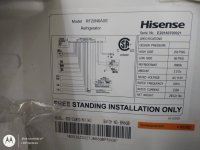I'm hoping to purchase a Cyclone and I've noticed most units come stock with the Residential Fridge option.
I was hoping to hear some "real-world" stories about how long it takes to recharge the stock batteries with the onboard Onan. If I recharged the fridge batteries daily for 2-3 hours, could I live off-grid for a week? I realize there are other power draws with off-grid living, but I think the fridge power setup is separate from the house power setup, right?
If the stock batteries are intended just to get you to the next power pedestal (which I'm thinking may be the case) -- has anyone replaced these w/ 2 100 amp Litho batteries...and if so...could I achieve what I'm hoping for with that kind of setup?
Basically, I'm trying to figure out how much extra $ will be required to use a residential fridge off grid for at least 3-4 days at a time...maybe up to a week.
If I replaced the 2 stock batteries with 2 100 amp Litho batteries (with faster recharge time and longer run time), could I achieve this, or would I need to upgrade anything else? Would I need more than 2 100 amp batteries?
I think the "house" power is a separate issue, so I'm thinking I would need at least 2 100 amp Litho batteries to run items on the house circuit, and I'm assuming a new charger and inverter....but I'm not trying to turn this into an alternative power thread. : )
I'm really trying to focus on just the fridge now....and whether a simple battery upgrade could give me extended stays off-grid and how much time I'll need to recharge the setup each day. Example....if it might take 6 hrs to recharge...this probably isn't the right option for me. However, if I could recharge by running the generator for an hour or two, and that would power the fridge the remainder of the day, I could see the benefit of a residential fridge. Is that wishful thinking?
Thanks, Tom
I was hoping to hear some "real-world" stories about how long it takes to recharge the stock batteries with the onboard Onan. If I recharged the fridge batteries daily for 2-3 hours, could I live off-grid for a week? I realize there are other power draws with off-grid living, but I think the fridge power setup is separate from the house power setup, right?
If the stock batteries are intended just to get you to the next power pedestal (which I'm thinking may be the case) -- has anyone replaced these w/ 2 100 amp Litho batteries...and if so...could I achieve what I'm hoping for with that kind of setup?
Basically, I'm trying to figure out how much extra $ will be required to use a residential fridge off grid for at least 3-4 days at a time...maybe up to a week.
If I replaced the 2 stock batteries with 2 100 amp Litho batteries (with faster recharge time and longer run time), could I achieve this, or would I need to upgrade anything else? Would I need more than 2 100 amp batteries?
I think the "house" power is a separate issue, so I'm thinking I would need at least 2 100 amp Litho batteries to run items on the house circuit, and I'm assuming a new charger and inverter....but I'm not trying to turn this into an alternative power thread. : )
I'm really trying to focus on just the fridge now....and whether a simple battery upgrade could give me extended stays off-grid and how much time I'll need to recharge the setup each day. Example....if it might take 6 hrs to recharge...this probably isn't the right option for me. However, if I could recharge by running the generator for an hour or two, and that would power the fridge the remainder of the day, I could see the benefit of a residential fridge. Is that wishful thinking?
Thanks, Tom
Last edited:

